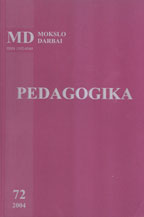Jaunesniojo mokyklinio amžiaus vaikų emocinių išgyvenimų muzikinės veiklos metu ypatumai
The Peculiarities of Emotional Experience in Musical Activities of Junior School Children
Author(s): Rūta GirdzijauskienėSubject(s): Education
Published by: Vytauto Didžiojo Universitetas
Keywords: emotional experience; musical activities; junior school children; spirituality; values; mternalization.
Summary/Abstract: Emotional experience is a very important part of mental and physical activities of a child. While playing, studying, communicating children of primary school age experience the emotions of joy, satisfaction, fascination, sadness, fear and pride. During that period moral, aesthetic and practical feelings are formed. The results of the research show that more than a half of primary school age children often experience strong emotions in musical activities. Pupils go through the emotions of joy as well as sadness. Positive emotions in musical activities are experienced more often. Usually pupils rejoice expressing music in various ways, feel satisfaction playing music^ are proud of their individual or class achievements. Children mainly grieve when they do not succeed in one or an other activity. When evaluating their emotional experience children of that age most often specify the extreme levels of their experience, i.e. indicate whether they feel everything very deeply or do not worry at all. In addition, girls' experiences of everything are stronger than boys' as well as the experiences of the third-formers compared to the first-or the second-formers. Pupils themselves think that they undergo positive and negative emotions in musical activities more often than it is pointed out by teachers.
Journal: Pedagogika
- Issue Year: 2004
- Issue No: 72
- Page Range: 38-43
- Page Count: 6
- Language: Lithuanian

